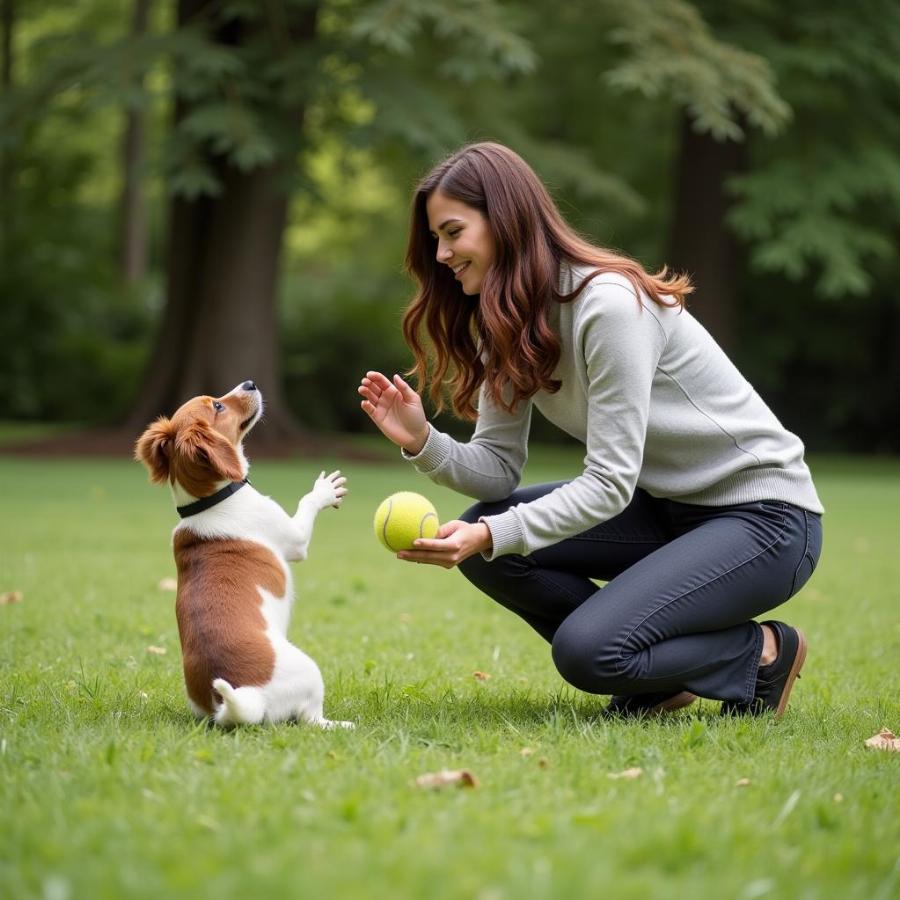Dog animal repellents can seem like a quick fix when your furry friend has unwanted interactions with other animals in your yard. But before you reach for that spray bottle, it’s crucial to understand exactly what these repellents are, how they work, and if they’re the right choice for your situation. Let’s delve into the world of dog animal repellents to ensure you’re making the safest and most informed decision for your beloved pet.
Understanding Dog Animal Repellents
Dog animal repellents are typically sprays or granules designed to deter animals from entering a specific area. They come in various forms, each targeting specific senses of animals:
- Scent-Based Repellents: These repellents utilize scents that are unpleasant to animals, such as citrus, peppermint, or citronella. The strong odor aims to discourage animals from entering the treated area.
- Taste-Based Repellents: Applied to surfaces, these repellents leave behind a bitter or unpleasant taste that deters animals from chewing or digging.
- Combination Repellents: Some repellents combine scent and taste deterrents for a multi-sensory approach to keep animals away.
Are Dog Animal Repellents Safe?
The safety of dog animal repellents is a complex issue. While many products claim to be pet-friendly, it’s essential to exercise caution. Some potential concerns include:
- Toxicity: Certain ingredients, especially in chemical-based repellents, can be toxic to dogs if ingested or inhaled. Always check the ingredient list and opt for products specifically labeled as safe for pets.
- Allergic Reactions: Some dogs may have sensitivities or allergies to certain scents or ingredients commonly found in repellents, leading to skin irritation, respiratory issues, or digestive problems.
- Ineffectiveness: Not all repellents are created equal, and some may be ineffective for certain animals or in certain situations. It’s essential to choose a reputable brand and follow product instructions carefully.
Exploring Alternatives to Repellents
Before resorting to repellents, consider these alternative methods for managing unwanted animal encounters:
- Reinforce Boundaries: A secure fence is often the most effective way to keep unwanted animals out of your yard and provide a safe space for your dog.
- Supervise Outdoor Time: Supervising your dog while they are outdoors allows you to monitor their interactions with other animals and intervene if necessary.
- Training and Behavior Modification: Teaching your dog basic commands like “leave it” and “come” can help prevent unwanted interactions and ensure their safety.
Choosing the Right Repellent (If Necessary)
If you’ve exhausted other options and decide to use a dog animal repellent, follow these guidelines:
- Consult Your Veterinarian: Speak with your veterinarian before using any repellent on your dog or in your yard to ensure it’s safe for your furry friend.
- Choose Reputable Brands: Opt for well-known brands with a proven track record of safety and effectiveness.
- Read Labels Carefully: Always read and follow product instructions meticulously. Pay close attention to warnings and cautions.
- Test in a Small Area: Before applying the repellent to your entire yard, test it in a small, inconspicuous area to observe your dog’s reaction.
Protecting Your Canine Companion
 Dog owner playing fetch with their dog in the backyard.
Dog owner playing fetch with their dog in the backyard.
Navigating the world of dog animal repellents requires careful consideration and informed decision-making. While they can play a role in deterring unwanted animal encounters, their safety and effectiveness should be carefully evaluated. By exploring alternatives, choosing products wisely, and prioritizing your dog’s well-being, you can create a harmonious and secure environment for your beloved canine companion.
Frequently Asked Questions about Dog Animal Repellents
Q: Are homemade dog animal repellents effective?
A: While some homemade recipes exist, their effectiveness varies. It’s crucial to research ingredients thoroughly to avoid potential harm to your dog or other animals.
Q: How long do dog animal repellents last?
A: The longevity of repellents depends on the product, weather conditions, and application frequency. Most repellents require reapplication after rain or every few weeks.
Q: Can I use dog animal repellents around my garden?
A: Some repellents may be safe for gardens, but always check the product label. Certain ingredients can be harmful to plants.
Q: What should I do if my dog ingests a dog animal repellent?
A: Contact your veterinarian or the ASPCA Animal Poison Control Center immediately.
Q: Are there repellents specifically for certain animals, like squirrels or rabbits?
A: Yes, some repellents target specific animals. Check product descriptions to find the right one for your needs.
Seeking More Information?
For further insights into keeping your dog safe and happy, explore these related topics:
- my dog killed a possum
- lawn fertilizer safe dogs
- no digging dog spray
- organic dog bed
- how to keep dogs out of yard
About Beaut Dogs
Beaut Dogs is your one-stop resource for all things dog-related, providing trustworthy and insightful information to help you navigate the wonderful world of canine companionship. Need tailored advice? Email us at [email protected] and our team of experts will gladly assist you.